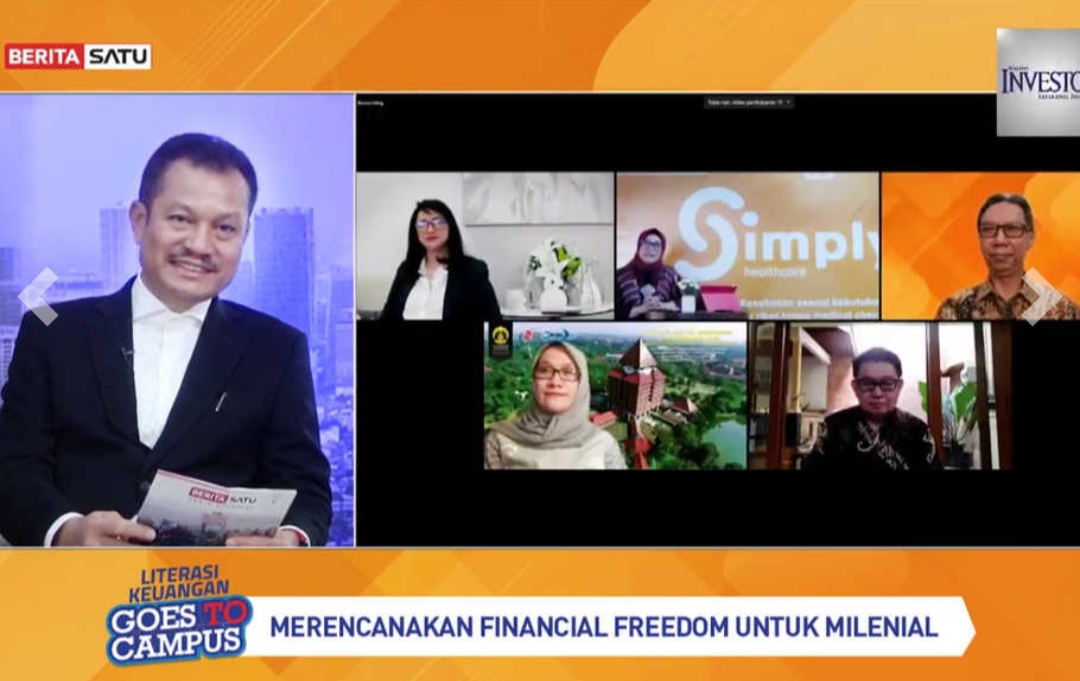Financial Literacy Goes to Campus
Nino Eka Putra ~ FEB UI Public Relations Officer
DEPOK – (15/9/2020) The Faculty of Economics and Business, Universitas Indonesia (FEB UI), in collaboration with Berita Satu and Investor magazine, the OJK, and supported by PT Bank Rakyat Indonesia (Persero) Tbk and PT Asuransi BRI Life, on Tuesday (15/9/2020) held a webinar titled “Financial Literacy Goes to Campus”, taking “Tips for Achieving Financial Freedom for Millennials” as its theme.
Speakers at the webinar were Prof. Dr. Budi Frensidy, professor of FEB UI, Tina Meilina, Executive Vice President, Wealth Management Division BRI, and Anik Hidayati, Marketing Director, BRI Life. The webinar was moderated by Primus Dorimulu from Berita Satu Group.
Dr. Beta Yulianita Gitaharie, Acting Dean of FEB UI, in her welcome speech said that Indonesians are going through an era of uncertainty made even more complicated, complex and obscure by the massive and rapid flow of information. In view of the situation, financial literacy is imperative as a source of information, knowledge, skills, and confidence that could influence attitude and behavior to improve decision making and financial management. Financial literacy imrpoves our knowledge of financial products, gives us confidence in making decisions about what products to choose, and reduce the chance of our becoming victims of frauds disguised as attractive offers.

An OJK survey revealed that Indonesia’s financial literacy rate is relatively low, at around 38% in 2019. “UI, particularly FEB UI, is pleased to have the opportunity to host the webinar . We expect the webinar to widen the horizon of students who participate in this event so that they can choose the right financial instruments to save and invest their money and by doing so participate in supporting quality economic activities,” said Beta.
Tirta Segara, OJK Commisioner in charge of Consumer Education and Protection, said in his keynote speech that the Covid-19 pandemic has changed our lives in many ways. This means it is even more urgent for financial literacy to keep up with the changes and to learn the lessons from the pandemic. Financial literacy is important for millennials for five reasons, namely the fact that they are future leaders and critical economic players, the low financial literacy rate of 38%, they are more financially vulnerable, have no emergency funds, and rampant illegal investment shcemes.

“To deal with the phenomenon, the OJK offers six tips for achieving financial freedom. First, understand your financial condition because financial freedom cannot be measured by how much you earn but whether your earnings can cover your expenses; second, set your financial goal; third, find alternative sources of income; four, invest and save your money; fifth, pay off your debt; and six set up an emergency fund. Make sure that the investment products you choose are legal and logical because many illegal investment products are rampant during the pandemic. Until 3 July 2020, the OJK has identified 792 illegal investment products, 2,588 illegal fintech firms, and 93 illegal pawn shops. People can seek OJK’s advice regarding suspicious investment schemes or report them to OJK 157 (WA 081157157157), email konsumen@ojk.go.id atau waspadainvestasi@ojk.go.id,” said Tirta.
Budi Frensidy discussed the difference between wealth and prosperity. A wealthy person is a person with great wealth or whose net worth is above that of the average person. Prosperity is a person’s ability to live without having to work (Kiyosaki, 1998) or the cashflow from productive asset/passive income enables a person to meet the normal living standards. If your expenditure is Rp5 million and your liquid asset is Rp100 million, you can live for 20 months without having to work. If you have productive asset, you can survive more than 20 months without working. This is financial freedom. A wealthy person is not necessarily a prosperous person and we all should attain financial freedom rather than wealth.

Budi further said that to achieve financial freedom and other financial goals, you have to make financial plans. You don’t have to hire a professional to make your financial plans because you can do it using financial math, knowledge of financial and investment products and self-discipline.
Budi added that the key to financial freedom is having productive asset and avoiding consumption asset, a simple lifestyle or self-discipline, only buying things you need not things you want, building your wealth from early on, and understanding the 72 rule. The 72 rule is yield multiplied by annual return and number of years to double initial amount so that the end result is 72. P is 2P if and only if i x n = 72. P becomes 2P ~ i x n = 72. For example, if you can get an annual yield or return of 4%, then you must wait for 18 years to double the amount of your money. If you get an annual return of 6%, then you must wait for 12 years; 9 years for annual return of 8%, and so on.
“Remember, the most important thing is to achieve financial freedom, not wealth,” said Budi at the end of his presentation. (htjp)
The article also appeared in Suara Pembaruan and can be accessed via: https://beritasatumedia.cld.bz/SP-200916-P
(lem)





